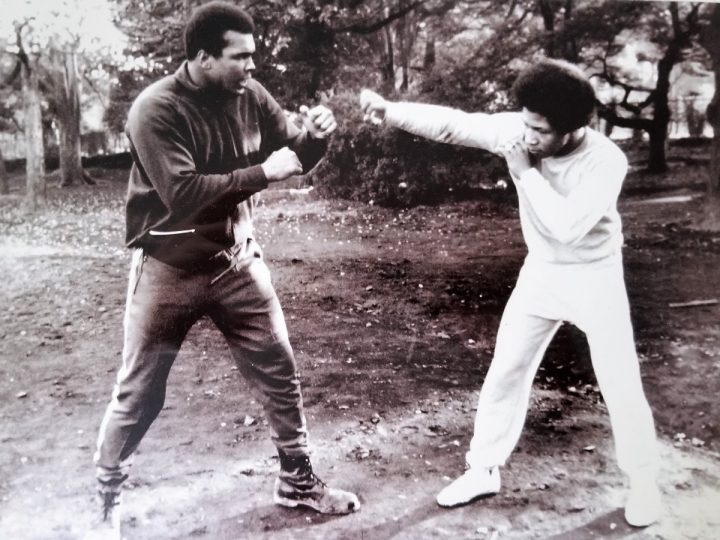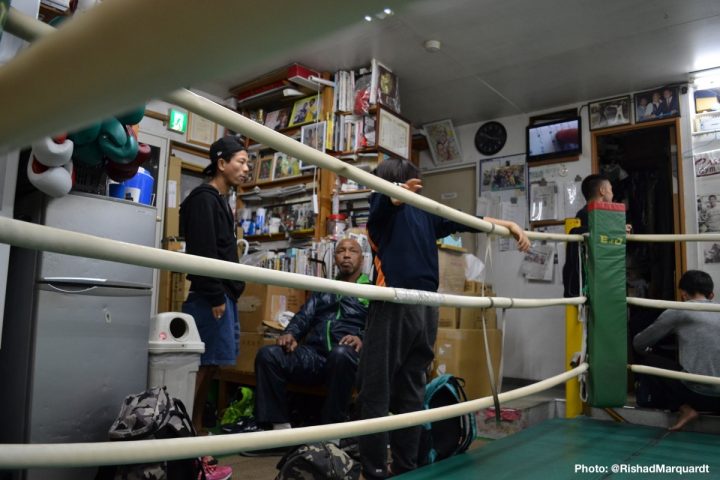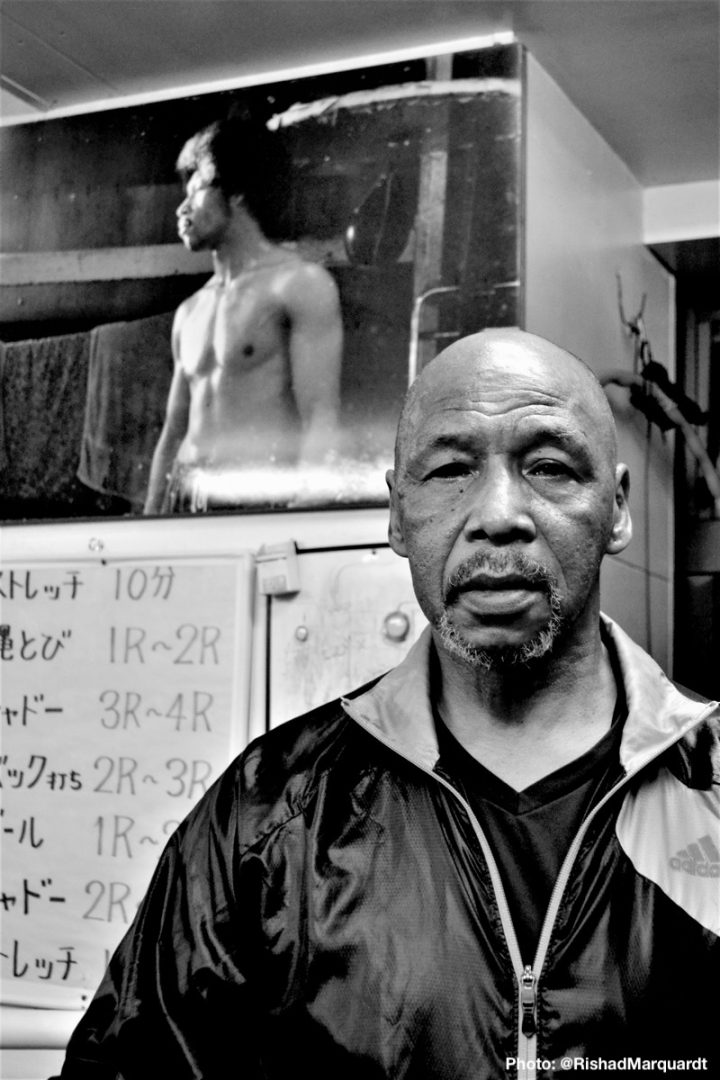
By Rishad Marquardt – It was a warm evening in late-summer. The humidity had intensified and eventually turned into a heavy downpour. I stumbled around the backstreets of Yokohama’s neon-lit Chinatown trying to find the boxing gym that belonged to the man I was about to interview and meet for the first time; Cassius Naito. Nestled away on the second floor of a large and dated apartment block perched over small high-street, the E&J Cassius Gym was non-descript and fairly anonymous. I hurried up the stairs whilst folding away my umbrella, found the front entrance and entered. The mixture of humidity and sweat in the air momentarily fogged my glasses and rendered me visionless. I was welcomed by several strong and loud military-style welcomes in Japanese from young people training away in this tiny gym. A young woman approached and asked if I was here for the interview and informed me that Cassius was on his way. She ushered me to a small bench by the door and told me to wait there until he arrived. I sat attentively, looking at the myriad of books on the shelf and photos on the wall, scanning and searching for familiar faces.
Cassius Naito, now 69 years of age and suffering from throat cancer, was a former professional boxer. Cassius was the son of an African-American father who fought and died in the Korean War, and a Japanese mother. Black and white photos of Cassius taken in his youth hung from old photo frames and drew me in. All of the pictures shared something in common; Cassius’ gentle and kind expression. Most boxers you come across have two types of photo taken. One is their smiling face that they construct for the camera, the other is their fight face that exposes a nasty side – a side that they need to bring with them into the ring. Many of the people training in the gym were teenagers; boys and girls going at it in this colourful gym, smashing at the heavy bag with hip-hop playing in the background. After a few minutes, Naito arrived. Despite being almost 70, he walked and spoke with the vigor of a much younger man. He quietly greeted me and suggested we go somewhere quieter and so led me to a coffee shop around the corner. There were two young women behind the counter, probably university students working there part time. As we sat down and talked, I felt their gaze several times and the picture in front of them probably didn’t quite add up. Why were a scruffy bearded European-looking guy in his thirties and a black senior-citizen speaking in Japanese and conversing for the best part of three hours?
I first came across Cassius’ story when an acquaintance had told me a previous article of mine on a young prospect by the name of Andy Hiraoka had reminded him of a short story written by a well-known Japanese author in the 1970s. The title of the story was ‘The man who couldn’t become Clay’. The Clay being referred to was of course Cassius Clay and it told a story of how after spending time with Naito around the time of one of his fights towards the end of his career, the author had come to the conclusion that the reason why Naito who at the time was a big prospect in Japan, never fulfilled his potential of becoming world champion. He put this down to the fact that he was too nice. The pitch was that he was too sensitive and lacked the ability to deploy a mindset of brutality required of men who made their living in a boxing ring. I was intrigued by his story and requested to meet him in person.
As we sat down, he spoke of his experiences growing up around Yokohama near the US military bases, but significantly, not in them. Children of military men and women based overseas can sometimes join their parents. Cassius’ father was killed at war in South Korea and so he grew up with his Japanese mother’s family. In the 1950’s, Japan was recovering from the physical damage that it endured during the war but also from the psychological damage it endured. It went from a nation who had become high from the fumes of propaganda which had led them to believe they were superior to a state of surrender and humility. Sentiment about foreigners at the time would have been complicated to say the least. For his appearance alone, Cassius was bullied on a daily basis but somehow made it through. Straight after a nations pride had been dismantled in the face of defeat to the US, how on earth did he survive in a society that at the time was bound to have regarded him as an outsider? ‘I never hated them. I understood why they were doing what they did.’ He had an unconventional way of making them stop. ‘When three or four kids would come to beat me up, I had to at least try and fight back to defend myself. So I would pick one, even if he wasn’t the one to throw the first punch, I would go for him and him alone. That kid would start to shout and complain, “why are you always going for me!” Eventually, he would stop coming and so then I’d go for another one.’ Cassius explained this, chuckling at the same time. ‘Even though it was hard, a few kids, they befriended me and started to help me by telling the other kids to leave me alone.’ I suggested that must have had a profound effect on how he perceived other people at the time – that not everyone was bad. ‘Those guys that helped me out, I’m still friends with them to this day’.

Cassius was a fantastic hurdler throughout his youth and for a long time was a touted prospect until he tried out boxing. He was taught a very conventional style of boxing. Hands held high, and that if you get hit, hit back. This was very different to the American boxing he had seen on TV, especially that of Muhammad Ali, who then was Cassius Clay, and who’s strategy was to hit and not get hit. One day, he walked in to a Gym that Eddie Townsend was the trainer for. By the time he retired Eddie was the trainer of multiple world champions. The work he was doing was exactly the boxing Cassius was after. They started to work together in what was to be a long and important relationship for Cassius until Eddie’s passing in 1988. He became a father figure for him and to this day holds him close to his heart. Eddie trained many World champions but in one interview, when asked who had the most talent, he swiftly replied that Cassius was that guy.
Cassius embarked upon his journey as a pro but although he challenged for a world title, never managed to capture one himself. Something that doesn’t seem to bother him now as he runs his own gym and devotes himself to training and helping young fighters, something that he expressed is actually his true passion. He had a wonderful elementary school teacher who he cherished a great deal and from a young age wanted to become a teacher himself. The father of Rikki Naito – the current OPBF Super Lightweight champion, Cassius now has the capacity to guide and help others. It is in that capacity he has found his calling.
Despite having a very tough childhood, it was a different topic that provoked the biggest emotional response from him; when he brought up Muhammad Ali. Cassius Naito’s real name is Junichi Naito. He wanted to adopt the name Cassius as he admired Muhammad so much, he wanted to use his name, and one day, he got the opportunity to ask permission from the man himself. Naito was a young man and Cassius Clay had already become Muhammad Ali. Ali at first refused Naito on the grounds that Cassius was a slave name, and that if Naito demanded to use his name, it should be Muhammad. But surprisingly, Naito refuted and told him that for him, Cassius Clay would always be Cassius Clay, and that the name and what it meant to some people and even Muhammad himself didn’t matter, because to him, it meant something so special. He admired him for his boxing skills and the humanist and civil rights leader he had become. Upon repeated denials, Muhammad finally caved in. Some years later, in April 1972, Ali came to Japan to fight Mac Foster. Naito was in the crowd and after the fight, Ali picked him out and spoke to him. ‘I couldn’t believe that such a great man could remember someone so average like me’, he said as he wiped away the tears. ‘That meant so much to me’. I was a little taken aback by how much Ali had effected Naito, and at the same time, it hit home just how monumental a figure Ali was. How many other lives had Ali touched in the same way? Sure, we see on the TV all the time people talking about how great he was, but hearing this first hand, and witnessing such an emotional response really put that into context.
I met Cassius not sure about what kind of a man I was going to meet or if ‘the man who couldn’t become clay’ had become bitter about never getting his hands on a world championship belt, about what never was. What I found was quite contrary to that. He was full of smiles, and spoke with nothing but goodwill about people, and was at peace. We went back to the gym after we had finished talking so I could take photos. As he spoke of what it meant to him to be in a teaching role, the type of work he originally wanted to do, I remarked that listening to him speak about life now he seemed very happy. ‘I’m probably that happiest now, more than I have ever been at any point in my life.’
Twitter: @RishadMarquardt
